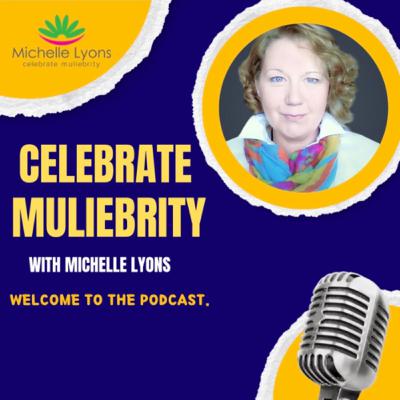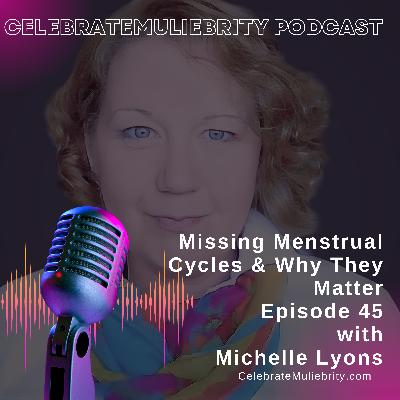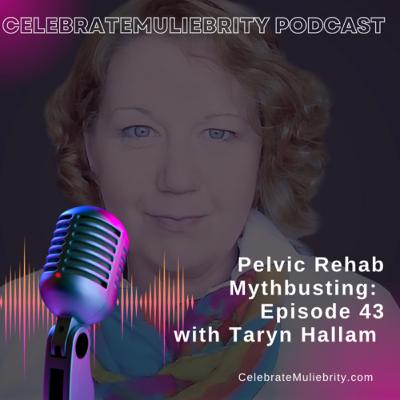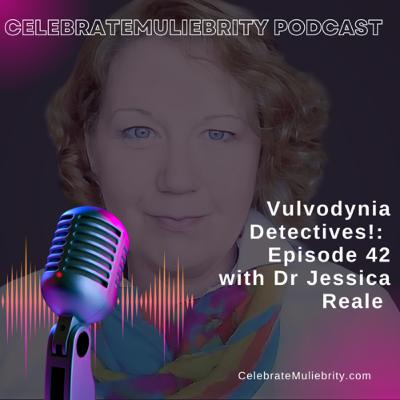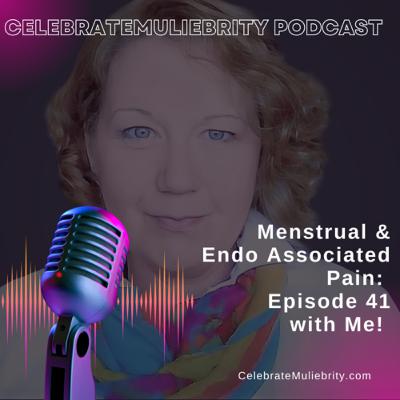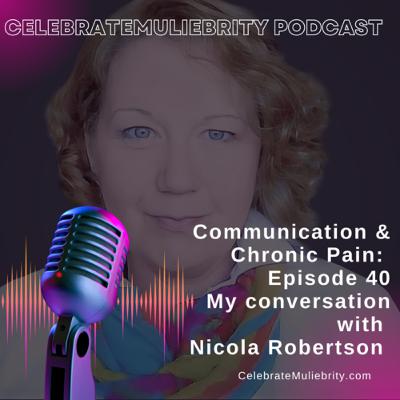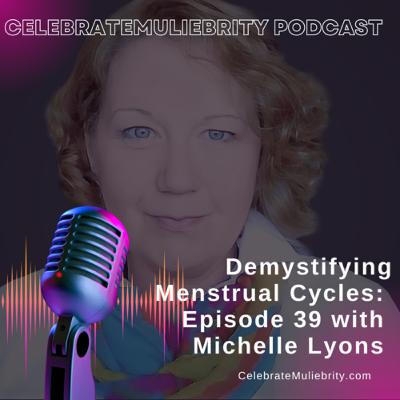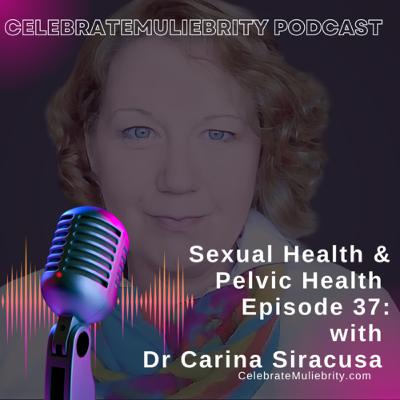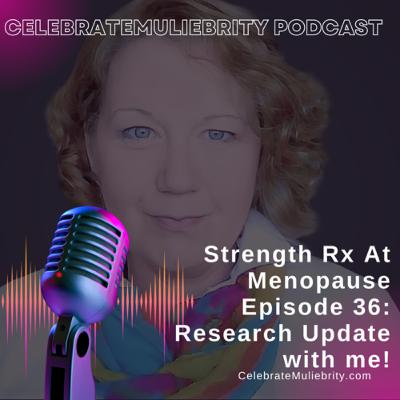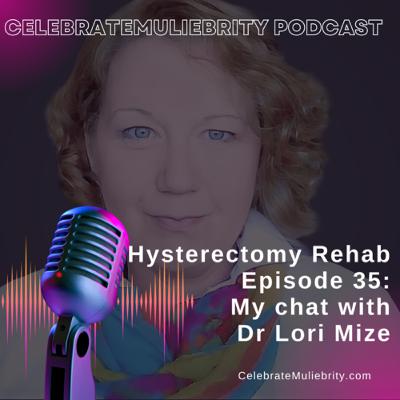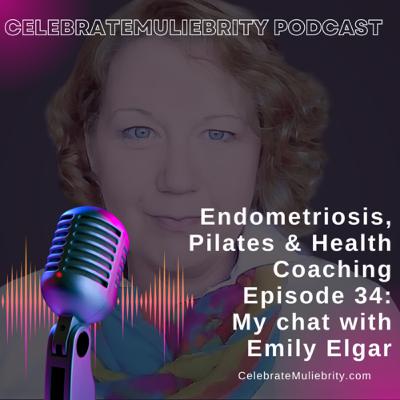Discover Celebrate Muliebrity with Michelle Lyons
Celebrate Muliebrity with Michelle Lyons

Celebrate Muliebrity with Michelle Lyons
Author: Michelle Lyons
Subscribed: 51Played: 1,667Subscribe
Share
© Michelle Lyons
Description
Muliebrity is the art and state of being a woman and I think that should be celebrated! Join me as I discuss all things women's health, share new research and talk with some of the cleverest people in women's health...and don't forget to celebrate muliebrity!
104 Episodes
Reverse
Hello & Welcome to this episode - it's just me this week, taking a look at what's new in the understanding, assessment & effective treatment of vulvodyniaAll this week, I’ve been recording and uploading lectures and handouts and resources to the brand new vulvodynia module of my online Female Pelvic Pain Rehab course - and I wanted to share some of the highlights here in the podcastThe past 12 months have produced not only interest but clinically relevant research - it’s a great time to be working in pelvic pain rehab and one of my favourite things to do is to nerd out in the literature and see what’s clinically relevant There’s been a nice mix, from case reports to systematic reviews with meta analyses - and I love to see a growing awareness of the importance of a multimodal (and always non-nociceptive!) approach, whether considering trauma informed assessment interviewing skills to what we need to add to the pelvic rehab treatment toolbox to a library of handouts we can give to our patientsVulvodynia can be a scary diagnosis for both clinician and patient, so I want to take the fear factor away and create a paradigm or flowchart for clinical reasoning, from ruling out differential diagnoses to looking at what the evidence supports for treatment options (spoiler: it’s more than just using/ progression through a dilator set!)If you’re already enrolled in the online Female Pelvic Pain course, you don’t need to do anything - everything is uploaded in the portal….and if you haven’t signed up yet…come and join us! Apart from vulvodynia, you can take a deep dive into endometriosis, IC/Bladder Pain Syndrome, Pelvic Neuralgias, Female Sexual Pain and more! All through a biopsychosocial, pelvic rehab meets lifestyle, evidence based approach! All the details at CelebrateMuliebrity.com 🥳💗Until next time, Onwards & Upwards! Mx#celebratemuliebrity
Hello & Welcome to the latest episode of the Celebrate Muliebrity podcast!After a short Easter break and a trip to Prague to present at SEUD (more about that soon!) we’re back with a new podcast episode - where Dr Becky Parr and I had a great time discussing pelvic health in athletes, trauma informed care and pelvic girdle pain & pregnancy related abdominal wall neuropathy (or PRAWN 🦐)Curious? Read on!Becky explains that PRAWN is an umbrella term for various abdominal nerve entrapment syndromes, often misdiagnosed as round ligament pain. She describes the anatomy involved and how the condition develops, typically around 12 weeks of pregnancy. We explored diagnostic techniques, particularly the Carnett's test, which helps differentiate between abdominal wall pain and visceral pain, and the importance of examining the abdomen for scars and assessing myofascial mobility when treating PRAWN.Becky has just had a paper on this topic published in the most recent issue of the pogp journal, which has become a must read resource for pelvic health clinicians under the stewardship of Grainne Donnelly at the editorial helmWe also discussed Becky’s other research interests, around the importance of integrating trauma-informed care principles into clinical practice, particularly in pelvic health settings. Becky shared her experiences teaching a mindful patient management course and conducting a longitudinal study on the impact of trauma-informed care on dpt students. We also discussed Becky's ongoing research on how pelvic health therapists become trauma-informed and the potential benefits of this knowledge for clinical practice and I’m looking forward to seeing this presented at IUGA in Barcelona in June. I’ll be there too, presenting about sexual health after cancer - will I see you there? Let me know!You can find Becky on LinkedIn , ResearchGate and on instagram as @beckyparrptI’m there too as @michellelyons_muliebrity, where you can follow my adventures in women’s health, stay up to date with research and find out more about my online courses (or visit CelebrateMuliebrity.com)Until next time, Onwards & Upwards! Mx #celebratemuliebrity
Hello & welcome to this episode all about the intersection of hip health and pelvic health, with one of my favourite researchers/clinicians, Dr Alison GrimaldiIn this episode we discuss the interconnectedness of the pelvic floor, hip muscles, and nerves in the pelvic region, how the pelvic floor works in conjunction with other muscles, particularly the obturator internus, to support pelvic function. We emphasized the importance of considering both pelvic floor and hip issues when treating patients, as weakness in hip muscles can affect pelvic floor function and vice versa. The conversation also covers the potential for sciatic nerve irritation in the deep gluteal space, particularly in athletes like cyclists and trail runners, and the importance of screening for pelvic floor issues in patients with hip or buttock pain.We shared our mutual disdain for the clamshell exercise (WHY do people recommend it?) and an exploration of Alison’s 2025 open access paper - a masterclass on gluteal tendinopathies Want to learn more from Alison?Here is the link to the Glasgow workshop: https://www.hampdensportsclinic.com/events/events-the-hip/and more course info: https://dralisongrimaldi.com/event/online-hip-workshop-lateral-hip-and-buttock-pain-2025/ And if you’d like to learn more about the role of hormonal health in just about everything, but especially in a woman’s musculoskeletal health, head to CelebrateMuliebrity.com for info on my online Female Hormonal Health Masterclass & other courses, from Female Pelvic Pain, to Hysterectomy, Breast Cancer, Pelvic Cancer, Bowel Health & Back Pain - let me know if you have any questions via Instagram where I nerd out about women’s health as @michellelyons_muliebritySee you next time! Mx
hello again!I'm still a bit croaky but nevertheless, I persisted!In this week's episode, I want to look at how we can best help women with dyspareunia (and maybe throw a bit of evidence based myth busting into the mix!)In this episode I talk about the different types of sexual pain, the drivers and how we can best come up with clinically reasonable treatment planning, that includes pelvic rehab at the centre of a multi-modal approach.The main focus is on finding the drivers - is it superficial or deep? Is it primary or secondary? Is there a specific diagnosis? Is there always a bio cause (are we including the psychosocial? the nociplastic?) Are we comfortable having the discussions? I think yes, if we know what questions to ask AND what to do with the answersI think the key to good outcomes is to believe the story, take a great history, create a safe space to discuss these issue and having a deep and wide biopsychosocial treatment toolboxLet me know if you'd like a Part 2 on treatment strategies! Or in the meantime, if you'd like to learn more, my new course 'Female Sexual Health, Contraception & Fertility - considerations for pelvic rehab'. It's still on pre-sale pricing until the final module is released next weekend! You can find the details on my website or in the bio of my Instagram account @michellelyons_muliebrityUntil next time! Onwards & Upwards, MxAll the course info can be found right here too! https://michelle-lyons-muliebrity-education.teachable.com/?preview=logged_inLet me know if you have any questions!
Hello & Welcome to this conversation with my guest today, Dr Siobhain O'Mahony, who has not only a successful career as an academic and researcher in the field of the microbiome and women's health, from fertility to menopause; she also works in the Women's Health Research and Innovation space.In this conversation, we discussed everything from fertility to endo to menopause, including :the Microbiome Gut-Brain Axis and how it influences so many facets of women's health, from infertility to endometriosis to pregnancy & postnatal health and into menopause and beyondhow the gut and brain communicate - the Vagus nerve, the HPA axis and the immune systemthe role of the gut microbiota is different types of pain, particularly endometriosisresearch looking at how diet, microbiome and CBT for better outcomes with endometriosishow hormonal changes at perimenopause influence gut health; and why that's a bidirectional conversationwhat we can do to optimise gut health, hormonal health and stress resilience (spoiler alert: BROCCOLI!!!!)and much, much more!You can find Dr O'Mahony on LinkedIn & x.com - and you can find me mostly on Instagram (@michellelyons_muliebrity)This is the final episode of 2024 but I have some exciting conversations already lined up for 2025...in the meantime, if you'd like to continue your women's health education AND save €75, don't forget to use the code COCCYX24 at checkout! All the course info can be found hereAnd so...enjoy the festive season and I'll see you in January 2025! Onwards & Upwards, Mx #celebratemuliebrity
Hello & Welcome To This Week's Episode!
I'm really excited to share the conversation that I recently had with Dr Lori Brotto, and to take a dive into the research around mindfulness & pelvic health
If you're enrolled in my Female Pelvic Pain Rehab or my Female Sexual Dysfunction courses, you'll know that I love the research of Dr Lori Brotto; I think she makes the science around mindfulness & pelvic health clinically useful & accessible
Dr Brotto is a researcher and clinician who has authored over 150 papers on the benefits of mindfulness and she is also the author of one of my most recommended books, 'Better Sex Through Mindfulness: How Women Can Cultivate Desire'
She is a fan of multimodal biopsychosocial approaches to pelvic health, whether we are talking about GSM at menopause, vestibulodynia and sexual health concerns including lack of desire
In this conversation we discuss:
what mindfulness is, and how it can significantly affect pelvic health issues, from vestibulodynia to dyspareunia
how stress affects desire, and the differences between male an female responses
how to incorporate mindfulness when working with people who have vestibulodynia, as part of a multimodal approach
why we don't necessarily have to avoid painful touch - teaching people resilience and self-management and what to do in a flare
and much more!
I hope you enjoy this conversation as much as I did - I've been practicing and teaching mindfulness for years now but I definitely picked up some more pearls of wisdom here!
You can find Dr Brotto on Instagram as @drloribrotto and she also features on Masterclass (in the Menopause class) and The Principles of Pleasure on Netflix
If you'd like to learn more about multi-modal approaches to pelvic health AND ave some money, don't forget to use the code COCCYX24 at checkout on any of my online courses to save €75 - but only until the end of this month! All the course info can be found at CelebrateMuliebrity.com
Until next time! Onwards & Upwards, Mx
Hello & Welcome To The Latest Episode!I'm so excited to share a recent conversation I had with exciting pelvic health physio and researcher, Dr Malgorzata Starzec-ProserpioIn 2024, Gosia released 2 papers that I think will have profound implications for the way we work with women who have pelvic pain and dyspareunia (and maybe challenge some biases along the way!)'From Fragmented to Whole: Multimodal Physiotherapy as a Multifaceted Approach to Pelvic Pain in Women - Clinical Commentary' Starzec-Proserpio et al 2024'To contract or not to contract: should we use pelvic floor muscle exercises in the treatment of dyspareunia?' Solomon et al 2024In this episode, we discuss:the clinical implications of these articles for us as clinicians, and also why literature reviews are essential and their role.Common hypotheses about pelvic floor muscle exercises in dyspareuniaCan PFM exercises be harmful for women with dyspareunia? If so, when? What are the consequences?Evidence for the use of pelvic floor muscle exercises in the treatment of dyspareunia – effects and outcomesOur Conclusions: Nuances, nuances, and more nuances! Pelvic floor muscle exercises don’t necessarily mean doing 100 near-maximum Kegels a day! Blanket statements on social media may limit access to potentially beneficial interventions.You can find Gosia's papers by clicking on the links above and also on Research Gate and you can follow her on Instagram as @ starzecproserpio_phdYou can find my continuing adventures in women's health there too - I'm @michellelyons_muliebrityWant to learn more about female pelvic pain rehab? Or learn more about female sexual dysfunction, contraception & fertility? And save some money?My December sale is ongoing - just use the discount code COCCYX24 at checkout and save €75 on all my courses including the Female Pelvic Pain Rehab course and the brand new Female Sexual Health, Contraception & Fertility (along with all my other online offerings, including the Female Hormonal Health Masterclass,, the Breast Cancer Rehab course, Bowel Health & Women's Health, Female Pelvic Oncology Rehab, Women & Back Pain and Hysterectomy: Prehab to Rehab - all the info is HERE - but don't forget to use the code COCCYX24 at checkout to avail of this December Discount!!
October is awareness month for both Menopause & Breast Cancer, and one area of overlap between these two issues is that of musculoskeletal health
Sometimes, when we think about musculoskeletal health at menopause, we might immediately think of osteoporosis. Although that's a really important issues, and one I'll be addressing in upcoming episodes, for today I want to talk about muscle & joint pain at menopause
Musculoskeletal dysfunction affects between 70 and 80% of women going through peri to post menopause, with 25% of women having severe symptoms, including rotator cuff dysfunction or gluteal tendinopathy (which affects 1 in 4 women in their 50's and is often misdiagnosed as hip arthritis)
In today's episode, I'll discuss the latest research around why this happens (spoilers: oestrogen, inflammation & sleep disruption) and of course the evidence based strategies that we can use to help women live well before, during & after menopause, and (of course!) where pelvic health at menopause fits into the discussion!
If you'd like to learn more, there's a whole module on Menopausal health, including lifestyle, nutrition, sleep and physical activity, in my online course 'Female Hormonal Health Masterclass' which you can find here, alongside my other online courses. You can find & follow my continuing adventure in needing out on women's health research & education on Instagram @michellelyons_muliebrity
As always, I'd be super grateful if you can subscribe, rate & review the podcast on either Spotify or Apple
Until next time, Onwards & Upwards, Mx #celebratemuliebrity
New Podcast Alert 🚨
Labour and Delivery Prep. - Episode 46 with Susannah Haarmann
And we’re back! I have some great episodes coming up for the rest of the year and to kick off this latest batch, here’s my chat with Susannah about a biopsychosocial approach to helping women prepare for labour and delivery
We talked about:
👉various methods of tuning into and lengthening the pelvic floor for delivery
👉evidence based approaches to reduce pain before, during and delivery
👉how we can help improve communication with birth providers and give women strategies to advocate for themselves
👉strategies for preparing the mind and central nervous system as well as the body for labour
And more! Susannah has some great resources available at her website And here’s the link to her raffle where you can win a set of her handouts for free!
Want to stay up to date on what’s new and exciting (and clinically relevant!) in women’s health? Make sure you are following my Instagram @michellelyons_muliebrity and for info on all my online courses and podcast interviews, here’s the link!
Until next time, Onwards & Upwards, Mx #celebratemuliebrity
Why do periods go missing? (and why it matters?!)
In part 1 of this mini-series, we talked about de-mystifying the menstrual cycle and in part 2, I covered period pain management, and here in part 3, I want to explore missing menstrual cycles and the implications, for both performance and health
In this episode, I talk about:
Different causes of amenorrhea including POI, PCOS and REDs
Recognising the signs & symptoms of each
the implications for bone health, muscle function & recurrent injuries
The pelvic health implications - from new onset urinary incontinence, to postnatal recovery and fertility
Understanding at risk populations and recognising REDs patterns
Why menstruation is the 5th vital sign
what the research says...and more!
I've been taking a deep dive into the intersection of pelvic, hormonal and musculoskeletal health for female athletes - what we now know, what isn't widely known and putting all the pieces together from an evidence based AND clinically relevant perspective for rehab pro's - so there <may> be a new course coming this autumn! Stay tuned, especially to my Instagram michellelyons_muliebrity and for info on all my online courses, please visit CelebrateMuliebrity.com
Until Next Time, Onwards & Upwards! Mx #celebratemuliebrity
In today's episode, I am delighted to chat with Terri Robertson Elder, about movement optimism in pelvic health.
In the intro to the episode, I talk about some new research that I recently came across from Briand et al (2024) looking at changes in body composition and how women lose lean muscle mass starting at the age of 31!!!
Pelvic health shouldn't be a barrier to movement but there's still a lot of mythology about what we should and shouldn't do in postnatal recovery, for people with diastasis or pelvic pain...which is what Terri and I set out to explore.
I hope you enjoy the conversation - of course if you have questions, you can leave a comment on instagram for both of us - you can find Terri on instagram as @terri.elder.dpt and you can find me there too as michellelyons_muliebrity and for all the info on my courses, please visit celebratemuliebrity.com
Until next time, Onwards & Upwards! Mx #celebratemuliebrity.com
Spice Warning! This episode may have you questioning many concepts you once held dear as a pelvic physio!
If you’ve ever taken a course with Taryn, you’ll know she’s an expert when it comes to breaking down the research and exploring what it means!
In this episode, we discuss:
• why the PERFECT score is imperfect for assessing pelvic floor muscle strength
• current understanding of our role in management of stress urinary incontinence
• the importance of the p value
• prolapse - what role does physio play
• hyper mobility and pelvic health
• considerations for running & weightlifting
And much more!
This is a big episode so bring your pens and paper, and stay well hydrated!
You can follow Taryn on Instagram as @whta and you can see her at @pelvicon in September and for info on her courses & research updates, head to whta.com.au
🥳🥳🥳
Want to learn more about women’s health? You can find me on Instagram as @michellelyons_muliebrity and if you’d like to take a deeper dive as a women’s health pro, I have a suite of online women’s health courses covering menstrual to menopausal health, female pelvic pain, bowel health, back pain @ oncology rehab - head to CelebrateMuliebrity.com for all the details!
Until next time,
Onwards and upwards! Mx #celebratemuliebrity
Vulvodynia - is it a mucosal issue, a pelvic floor issue, a psychological issue...or all of the above? That was the question I asked on my Instagram feed recently, paraphrasing the research into this topic by Chisari et al.
So in this week's episode, I'm delighted to welcome Dr Jessica Reale back to the podcast, this time, to discuss Vulvodynia. It can be an intimidating diagnosis for both patient and provider but we explore what it takes to be an effective clinician working with people on this journey.
Some of the topics we talked about - hypermobility, inflammation, dermatological considerations, ruling drivers like hips, spines and nerves in or out as contributors and of course, bowel health gets a mention here too!
Jessica of course, along with Nicole Cozean, is one of the co-founders of Pelvicon and they are running a Vulvodynia Symposium with luminaries such as Stephanie Pendergast, Dr Rachel Rubin, Dr Jill Krapf, Dr Alex Milspaw and more. It's happening July 13 2024 and registration is opening on Tuesday the 9th of July - head over to pelvicon.com for registration info
But also:
Do you want to find out more about working with women living with pelvic pain diagnoses such as Vulvodynia, Endometriosis, IC/ Bladder Pain Syndrome and/or Pelvic Neuralgias? (And get the Functional Female Pelvic Anatomy course FOR FREE?!) My online Female Pelvic Pain Rehab course is available online with evergreen access and membership of a private student support group - you can find all the info on my website CelebrateMuliebrity.com
To stay up to date on all the latest in women's health, make sure you're following me on Instagram @michellelyons_muliebrity
Until next time, Onwards & Upwards! Mx
(and if you enjoy this content, I'd be grateful if you could subscribe, rate & review this podcast wherever you're listening to it!
This is part 2 of my Menstrual Health mini-series (pt1 covered the basics of the menstrual cycle and pt 3 will cover The Missing Menstrual Cycle - stay tuned!) In this episode, we’ll cover dysmenorrhea (from the Greek, meaning ‘painful monthly bleeding’ Did you know that menstrual pain affects 90% of those who menstruate, with 9% of those dealing with severe pain? That endometriosis affects at least 10% of women worldwide? That although meds and surgery are often offered as first line approaches, there’s good evidence to support other self management strategies including a whole person pelvic rehab biopsychosocial approach that includes lifestyle, movement, manual therapy to calm the nervous system and the pelvic floor, tens and pelvic pain education including strategies for bladder, bowel & sexual health. If we remember that lots of things go into the biopsychosocial bucket, including how we move, how we manage stress, how we eat, how we sleep …as well as tissue disorders, then we can provide, in the words of Mardon et al ‘validation, reassurance, education and empowerment’. Have a listen & let me know what you think - if you have any questions you can find me on Instagram as @michellelyons_muliebrity and if you’re a women’s health pro, you can find out more about my online courses at CelebrateMuliebrity.com. Until next time, Onwards & Upwards! Mx
What is good communication and why does it matter when we are working with people dealing with chronic pain?
There are a couple of papers that have caught my attention on this - Kays (2021) paper looking at the lack of empathy and its effects when we work with people who have chronic pelvic pain, but especially Kays (2022) paper 'Effects of Provider Interactions on diagnosis and care of people with chronic pelvic pain’.
These papers discuss the consequences of negative patient/ provider interactions, how it can increase the emotional toll and decrease trust and communication...essentially impeding proper treatment
And so, who better to discuss this with than Nicola Robertson, of Diamond Physiotherapy in Canada, who gave a brilliant presentation on this topic at CSM in Boston earlier this year.
In this episode we explore what communication means (beyond talking), why it matters and what we can/ need to do better.
You can find Nicola as @diamondphysiotherapy on instagram and you can find me there too, as @michellelyons_muliebrity
Want to learn more about a biopsychosocial / evidence based approach to women's health? All the details of my online courses can be found at celebratemuliebrity.com
Until next time! Onwards & Upwards, Mx
Menstrual Cycles - what are they, what do they mean, what happens when they're painful...or when they go missing?
In this short menstrual miniseries, I'm hoping to do some menstrual myth busting and really get to grips with the menstrual cycle so we are starting with an overview of the menstrual cycle & what's happening hormonally
(spoiler: menstruation is only one small part of the menstrual cycle!)
If we want to understand menopause...or return to exercise postnatally...or hormonally driven syndromes like endometriosis, or PCOS or even Irritable Bowel syndrome...then we have to right back to basics!
And of course if you'd like a deeper dive...AND you want to save money & get evergreen access AND the course upgrades coming next month...then head over to CelebrateMuliebrity.com and don't forget to use the code JUNE30 at checkout to save €75! (but only until the end of June!) You can also stay up to date on all my women's health nerdiness on Instagram (@michellelyons_muliebrity)
Stay tuned for the next instalment in this mini series on the podcast, where we'll explore what happens when periods go missing! (and what we can do to lure them back!)
Until next time, Onwards & Upwards, Mx
Dr Carina Siracusa is a polymath of pelvic rehab - with expertise in oncology, neurology, paediatrics and gender surgery rehab.
But...for today's conversation, we are talking about sexual health and the symbiotic relationship between pelvic floor dysfunction, sexual health issues and a bio psychosocial approach to helping people live well
In this conversation, we discuss:
how people often have a combination of pelvic health issues and sexual health issues
the people that we work with clinically, are we educated enough in the anatomy, physiology and psychology of sexual health?
how sexuality is affected by ageing, disability or illness such as cancer
key considerations for an appropriate pelvic rehab/ sexual rehab programme for someone with chronic pain
If you'd like to learn more about learning with Carina, you can find her on instagram as @carinadpt; she has continuing education courses online at Medbridge Education and she will be teaching her sexual health course via pelvichealthsolutions.ca live online later this year
If you'd like to learn more about working with people who have sexual pain with pelvic pain issues such as vulvodynia, I invite you to check out my online Female Pelvic Pain Rehab course which covers diagnoses such as vulvodynia, endometriosis, bladder pain syndrome/ic and pudendal neuralgia amongst others
If you are interested in sexual health in the postnatal to perimenopausal population, then my online Female Hormonal Health Masterclass might be a good fit! It has three modules, covering menstrual, maternal and menopausal health, and as with all my online courses, you have evergreen access.
You can find all the info on my online courses here at celebratemuliebrity.com and follow my continuing adventures in women's health on instagram as @michellelyons_muliebrity
Until next time!
Onwards & Upwards, Mx #celebratemuliebrity
hello there!
I'm in the throes of going though the new research that's emerging in the menstrual, maternal & menopausal space, and looking for what's going to change how we help women live well at each of these pivotal life stages.
There will be a deep dive and big updates in my online Hormonal Health Masterclass later this summer (you can sign up now and get the updates for free when they go live). Expect info on the influence of menstrual health (including endometriosis) on athletes, lots of new info on postnatal rehab and of course, up to date information on musculoskeletal and pelvic health at menopause
To start with, I'm going to use this week's podcast to discuss a new 2024 paper by Stimson et al looking at barriers to strength training at perimenopause - why it matters, what the barriers are, what I think they got right in this paper...and what they missed!
Moving forward with the podcast, there will be a combination of the expert interviews you've been enjoying (coming soon: pelvic health in athletes, communication skills, pelvic health & cancer and more...) AND some regular research updates (let's nerd out together!) and what they mean for our work helping women live well.
I hope you enjoy this review but let me know if there are topics in women's health that you'd like me to explore - I'm always open to suggestions!
Until next time,
Michelle
In the meantime, you can access my online women's health courses here and you can find me on Instagram as michellelyons_muliebrity for my continuing adventures in women's health
See you soon and don't forget to #celebratemuliebrity
Continuing the Hysterectomy conversation with the excellent Dr Lori Mize!
I've been deep in the research around hysterectomy as I've been creating my latest online course, 'Hysterectomy: Prehab to Rehab' (available now!)
Part of that research has been reaching out to friends & colleagues for their perspectives (have you listened to my interview with Lola Turvey about her personal & professional experience with hysterectomy yet? Episode 33 - so good!)
Full Disclosure: this is a serious topic but we had FUN with this conversation!
Dr Lori Mize is a force of nature and has been making huge contributions to the field of pelvic health for more than 20 years. We are both super passionate about women’s health, but today we decided to focus our attention on what we can do to help women live well after hysterectomy
Some of the things we discussed include:
👉 are women being served well, in terms of prehab and rehab, when it comes to hysterectomy (spoiler: no)
👉 the importance of ERAS approaches (Enhanced Recovery After Surgery) to mental & physical health after hysterectomy
👉 the role of education about what to expect - how knowledge can help decrease anxiety and improve wellbeing
👉 why we have to understand how anxiety, depression & grieving are both common and normal after hysterectomy & how we can support people
👉 the essential role we can have in supporting return to a high quality of life, whether we’re talking about pelvic health, the importance of scar mobility, returning to exercise and education about sexual health
Want to learn more? You can find Lori at pelvicrestoration.com and on Instagram and Facebook as @pelvicrestoration (I'm there too - you can find me on instagram as @michellelyons_muliebrity and...if you'd like to learn more about helping women live well before, during & after hysterectomy, you may be interested in my online course Hysterectomy: Prehab to Rehab
Enjoy the chat and let me know if you have any questions!
Until next week, mind yourself and don't forget to #celebratemuliebrity
I had the pleasure of meeting Emily at the World Endometriosis Congress in Edinburgh last May and I was delighted when she accepted my invitation to come on the podcast to discuss her approach to working with people with Endo
We discussed:
*what health coaching is (and isn't) and the difference between coaching, mentoring & being a clinician
*the role of health coaching in supporting people with endometriosis and how it can be the missing link
*Emily's defining question - why don't we do the things we know are good for us?
*The many roles pilates can play in helping people with endo live well, from the breath and pelvic floor, to restoring movement and building resilience
*how central sensitisation can affect people with endometriosis and using a mind-body strategy that has a focus on breath, awareness and exploring length and strength can help counteract the effects of nociplastic pain
we discussed a great paper by Maddern et al (2020) titled 'Pain in Endometriosis' and we also discussed 'Thinking Fast & Slow' by Daniel Kahneman.
You can find Emily on instagram as @thewomankindphysio and of course I'm there too as @michellelyons_muliebrity
want to learn more about treating people with endometriosis? My online course on Female Pelvic Pain Rehab covers endometriosis, vulvodynia, pudendal neuralgia, interstitial cystitis and as well as all that - you also get the Functional Female Pelvic Anatomy course for free!
You can find all the course info here!
Until next time!
Onwards & Upwards, Mx #celebratemuliebrity


